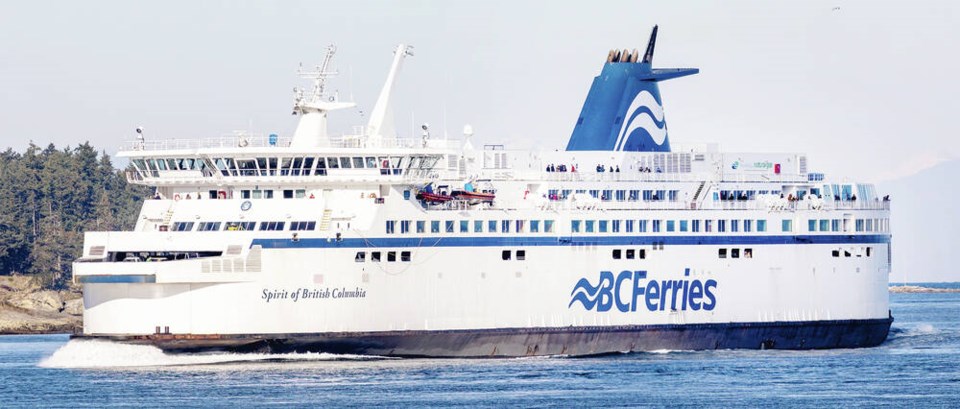The B.C. Ferry Commission has announced that ferry fares can increase a maximum 9.2 per cent per year for four years starting in April 2024, but the corporation’s president quickly responded by saying increases won’t go that high.
“I want to assure our customers, employees and partners that ferry fares will not be going up 9.2 per cent per year for the next four years,” Nicolas Jimenez said Friday, shortly after the commission’s report was made public.
He expects fare increases will be three per cent per year over the four years of B.C. Ferries’ next performance term, thanks to a previously announced provincial contribution of $500 million to reduce fare increases.
The commission was clear that it had not included the impact of the provincial money in its preliminary price cap announcement.
B.C. Ferry Commissioner Eva Hage set the stage for a drop from 9.2 per cent, saying the provincial funds will “allow us to lower the final cap accordingly.”
The commission’s final decision is due Sept. 30. The rate of increase will not be definitive until then.
Transportation Minister Rob Fleming reiterated the government’s goal to limit fare increases over the next four-year term.
“I want to assure British Columbians, particularly those who rely on our coastal ferry service, that our goal of holding annual average fare increases to no more than three per cent remains.”
The commission oversees B.C. Ferries by making decisions on such topics as price caps and major capital expenditures.
The cap sets the maximum amount that average ferry fares can increase by annually. It is reset every four years, covering what B.C. Ferries calls its performance term.
In the previous performance term, the price cap was 2.3 per cent and before that, it was 1.9 per cent.
The preliminary price cap is contingent on B.C. Ferries finding $10 million in operating cost savings over the upcoming performance term, the commission said.
Jimenez said while the organization runs very tightly, every business can find ways to be more efficient. “We have a number of those in our plans for the four-year term.”
Plans include redevelopment of the fleet maintenance unit which will bring savings over four years, investments in the larger terminals to improve the flow of passengers, and replacing old vessels with new more energy-efficient ferries. Existing vessels could be modified from diesel to bio-diesel, which is less costly and greener, he said.
The commission took a knife to the corporation’s proposed $5.2-billion capital plan over 12 years — the largest in the corporation’s history — cutting it by $330 million.
“The corporation must demonstrate good fiscal management and find a solid footing in which expenses align with revenues,” Hage said.
B.C. Ferries was told to come up with a plan outlining the steps it will take, in consultation with the province, to ensure the ferry service is financially sustainable, reliable, safe and affordable over the long term.
Jimenez plans to work with the commission in coming months to discuss the capital program
When it comes to the capital plan, “it is ambitious and it needs to be ambitious,” he said.
A lot of work went into planning for new ships, terminal upgrades and improvements to technology and services, he said.
The commission noted that labour difficulties and high inflation have hit B.C. Ferries’ bottom line hard, and it is in “less-robust financial shape than initially expected,” the commission said.
B.C. Ferries is dealing with higher fuel prices, increasing costs to maintain an aging fleet, and its capital plan. All that is creating “substantial pressure,” the commission said.
The company faces ongoing crew shortages, which has forced the cancellation of some sailings.
Pay rates in the contract with the B.C. Ferry and Marine Workers Union are being re-negotiated this winter because workers have complained about falling behind on wages as other employers offer higher rates.
A B.C. Ferries official said recently that it is planning to go ahead with the purchase of four new Island-class vessels this year. The corporation is reducing the number of classes it operates in a bid to be more efficient.
>>> To comment on this article, write a letter to the editor: [email protected]




